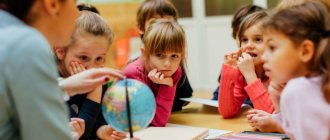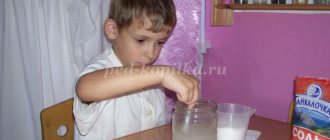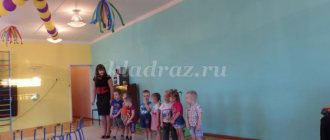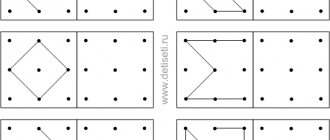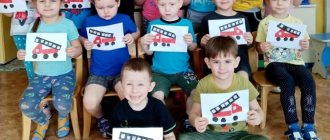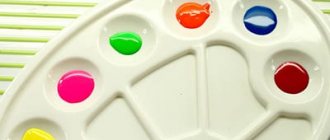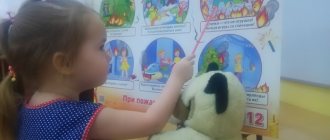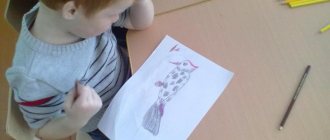Preparatory group. Senior preschool age. Children 6-7 years old
Summary of OOD on speech development for the preparatory school group “Coming up with a fairy tale on a free topic”
Municipal budgetary preschool educational institution Child Development Center Kindergarten No. 5 “Ryabinka” OOD on speech development for a preparatory school group on the topic: “Coming up with a fairy tale on a free topic ”
Educator: Okhrimenko M.Yu. Goal Lobnya Goal: to consolidate the ability...
Summary of an integrated lesson on speech development and design in the preparatory group “The forest is full of fairy tales and miracles” “The forest is full of
fairy tales and miracles ” Summary of an open integrated lesson on speech development and design in the preparatory group Purpose: To consolidate and expand children’s knowledge about the seasons, plant and animal world. Objectives: Educational: • Systematize knowledge about…
Summary of educational activities for speech development in the preparatory group. A journey through Russian folk tales
Lesson on speech development at a preschool educational institution.
Preparatory group. Topic: “Journey through Russian folk tales” Topic: “Journey through Russian folk tales” Educational area: speech development. Participants: Teacher and children of the preparatory group. Age: 6-7 years. Class type: Combined. Goal: Consolidating children's knowledge about Russian folk tales. Objectives: Educational:
Learn to recognize a fairy tale from illustrations, riddles, episodes;
strengthen children's skills in retelling fairy tales. Developmental:
Develop children’s speech and cognitive activity, the ability to compare, generalize, draw conclusions and inferences;
develop thinking, imagination, visual memory, observation. Educational:
To cultivate interest in Russian folk tales.
Equipment: A chest, a ball of thread, illustrations for fairy tales, a folder – an imitation of a book cover, 7 multi-colored pages, envelopes for modeling, envelopes with riddles, letters. Methods and techniques: Verbal:
surprise moment;
conversation; answers on questions; appeal to children's experiences; asking riddles; pedagogical assessment, incentives; Visual:
demonstration, examination of illustrations
Practical:
modeling a fairy tale;
solving a problem situation; search actions; didactic games; health-saving technologies (finger gymnastics, visual gymnastics, physical exercise, facial exercise). Preliminary work: Reading Russian folk tales (“Masha and the Bear”, “The Three Bears”, “Kolobok”, “The Fox and the Hare”, “Turnip”, “Teremok”, looking at illustrations for them; retelling fairy tales; didactic game “Find out) what fairy tale is the hero from." Expected result: - The child has an idea of fairy tales, knows the names and recognizes the heroes of fairy tales. - Masters the ability to reason and speak out. - Use of the acquired knowledge in independent activities. - Formation of practical skills in the child to work with various materials. Duration lessons: 30 min 1. Organizational moment: Children come in and stand in a circle. Mental health game. Educator: Children. What a wonderful day today. Let us give each other smiles and our greeting. Invented by someone simply and wisely, When greet the meeting: - Good morning! - Good morning! To the sun and the birds! Good morning! To smiling faces. And everyone becomes kind, trusting... Let good morning last until the evening. 2. Articulation gymnastics “Smile”, “Blow Kiss” 2. Main part: Teacher: - Guys, do you like fairy tales? (Children's answers) - Why do you love them? (Children's answers) - Guys, why do you think fairy tales are called folk tales (children's answers) (because they were composed by the people). Fairy tales were passed from one person to another. Therefore, fairy tales belong to oral folk art. Educator: - Guys, I brought you a new book of fairy tales. Look how beautiful she is! (I open it and it turns out that all the pages have disappeared). — Guys, where do you think the pages of the book disappeared? (children reason, express their assumptions). - instead of one of the pages there is a letter. Who could it be from? Let's read it. “Hello, kids! Can't find the pages of your book? It was I, Baba Yaga, who asked the Mighty Wind to scatter them throughout the Land of Fairy Tales! Search, maybe you will find! But don’t expect help from me!” Educator: Baba Yaga cannot live without harming anyone. You and I have a difficult task: we need to find all the pages of our book so that we can read it. We don’t know where this Land of Fairy Tales is located. How to get there? Who will show us the way? (children's statements.) Educator: In many Russian folk tales there is one magical object that shows the path for the heroes. Do you remember what this item is? This is a magic ball. I have such a ball; a sorceress friend of mine gave it to me. It is stored in this wonderful bag. (I open the bag and find an unwound ball there) Oh, guys, Baba Yaga managed to harm us here too, she unwound the whole ball. What to do, how to return the magical power of the ball? I know one way - I make one skein, and at the same time you call Russian folk tales. The more we name, the more magical powers the ball will have. Game “Name the fairy tales” : children pass the ball to each other, winding the thread and naming the fairy tale). Educator: - Look what a ball it turned out to be! Why is he so big? (children's answers). - That's right, because you know a lot of fairy tales! This ball will show us the way to the land of fairy tales. (The children, together with the teacher, say the magic words: “Help us with a ball, bring us to the Land of Fairy Tales!”, the ball rolled towards the chest). - Here is a task for us. Now I will read you an unusual fairy tale, listen to me and tell me what mistakes were made in the fairy tale. Fairy tale “Katya and the Three Wolves” Once upon a time there lived a family: mother, father and daughter Katenka. Katya went alone into the forest and got lost. She wandered through the forest and came across a hut. And in the hut lived a family of wolves who had gone hunting. Katya went into the hut and began to manage it. She ate porridge from the plates, sat on the chairs, and then went to bed on the smallest cot. The wolves returned from hunting and began to resent the fact that someone was in charge of their house. Katya heard the noise, jumped out the window and ran away. So the wolves never found out who had been in their hut. (The fairy tale “Three Bears”. In the fairy tale, the girl’s name is Masha. The heroes are not wolves, but bears. Masha lay down not on a folding bed, but on a bed.) Educator: So we found one page! Look what color? (red) Educator: Ball, my friend, help us find the remaining pages of the book! (The ball leads the children to the table, on which there is a letter from Baba Yaga: “Well, well done, kids! We finally found the road, and only one page. Just don’t be too happy, but better look into the envelope. See what I turned your favorite characters into ? If you manage to cast a spell, recognize the characters, what fairy tale they are from, you will get another page!" (Modeling fairy tales: “Masha and the Bear”, “Ryaba Hen”, “Turnip”, Children name the fairy tale, the heroes). Educator: - And so another page was found! What color (orange). - Let's look for ourselves, maybe the remaining pages are hidden somewhere nearby? Gymnastics for the eyes: “Let's look into the distance, look nearby, look up, down, draw a ball with our eyes." Educator: Nowhere not a single page is visible. Tangle, lead us further, show us the way! (They walk, approach the chairs, sit down.) Educator: Here is another letter, on the envelope it says “Help!” But I can’t understand who needs our help ? (I open the envelope and take out the cards.) Game “Help!” It is suggested not only to name those who need help, but also to try to help them.) “Help, three bears are chasing me!” (“Three Bears”) “Help! I broke the animals' house! (“Teremok”) “Help! I turned into a little goat!” (“Sister Alyonushka and brother Ivanushka”) “Help, my tail came off!” (“Sister Fox and Gray Wolf”) “Help! I turned into a cloud!” (Snow Maiden") Teacher: - What great fellows you are! And here is another page found. What colour? (Yellow) - Do you know what it says there? THANK YOU! These are the heroes thanking you! “Before we continue our journey, I suggest we play a little and let our ball rest!” Physical education minute “Fairy Tales” Here we planted it (bend over) And watered it with water (imitation of movement) The turnip grew good and strong (spread arms to the sides) And now we will pull it (imitation of movement) And we will cook porridge from the turnip (imitation of food) And we will We are healthy and strong from the turnip (show “strength”) Educator: - Our ball has rested and is ready to roll on! Let's see where it goes. (We approach the table where there are illustrations for fairy tales.) - Guys, look and tell me, what fairy tale is this illustration from? - shows an illustration from the fairy tale “The Wolf and the Seven Little Goats” - What does this fairy tale teach us? (Because you can’t open the door for strangers, listen to your mother, don’t be evil like a wolf, but you have to be kind.) - Look and tell me which fairy tale this illustration is from? — shows an illustration from the fairy tale “Geese and Swans.” What is the name of this fairy tale? Why did the swan geese take away my brother? Why did the stove, apple tree and river help Alyonushka? What would you do if you found yourself in this situation? - Look and tell me which fairy tale this illustration is from? — shows an illustration from the fairy tale “Ryaba Hen” (This is the fairy tale “Ryaba Hen.”) — Which chicken in this fairy tale is good or bad? (The chicken is good. She gave grandpa and grandma a golden egg, and when the mouse broke it, she took pity on them and laid them another egg.) - So we found two more pages of the book. What color are they? (Green and blue). - And the ball leads us further. (Children together with the teacher approach the table with riddles) - Do you like to solve riddles? If we solve all the riddles, Baba Yaga will return another page to us! 1. An arrow flew and fell into a swamp, and in this swamp someone caught it. Who said goodbye to green skin. Have you become cute, beautiful, pretty? (The princess is a frog) 2. A woman is jumping in heaven and on earth on a broomstick, Scary, evil, who is she? (Baba Yaga) 3. Which animal came second to live in the fairy-tale Teremok? 4. Which fairy-tale animal was unable to have lunch with the crane and taught Kolobok a lesson for bragging? (Fox) 5. Which fairy tale contains the words: “Are you warm, maiden, are you warm, beauty? (Morozko) 6. Who fulfilled all Emelya’s wishes? (Pike) Educator: - Well done, children, you guessed all the riddles! Here is another page. What color is it? (blue) - The ball is calling us forward! One more page left and we can assemble our book. - Stand in a circle, I suggest you play. Game: “You give me, I give you.” (Children stand in a circle. The leader from the middle of the circle throws the ball to the children, naming the animal. Children take turns answering in which fairy tale this hero appears.) For example: cow - fairy tale “Kroshechka - Khavroshechka.” Goat -…; Bear -…; Wolf -…; Geese -…; Fox -…; Chicken -…; Hare-…; Horse… - ; Well done! - Teacher: - The last page has been found! What colour? (purple) - Our book has all the pages in different colors. Let's name them all. Red, orange, ...., purple. — What do these colors remind you of? (Children's answers). - Colors of rainbow. Well done, now let's turn our book into a real book of fairy tales. Our magic chest will help us. Let's put the book in the chest and say the magic words “Snoop, snap, snoop!” For a miracle to happen , we need to say these magic words 3 times in different ways: • be surprised, eyes wide open, arms spread to the sides; • the face expresses dissatisfaction by uttering magic words and stamping our feet; • having fun, smiling, clapping your hands. (Children perform together with the teacher) Reflection: 3. Educator: Let's look into our chest! Look what book we were able to put together! We will read it with you every evening! You are all great! You are the best lovers of Russian folk tales, the best connoisseurs! Believing in a fairy tale is happiness. And for those who believe, the fairy tale will definitely open all doors. And he will give you something interesting. (Children receive coloring books as a gift from the chest). Baba Yaga sent you a gift for your courage, for your efforts, for your love for Russian folk tales. I suggest you color them at home yourself, then tell mom and dad a fairy tale about this hero. I propose to send our ball to a fairy tale, where it may be useful to other heroes, and go to our group themselves. Educator: - What do fairy tales teach us? -What kind of fairy tales are there? — What do you remember most from our lesson? (children's answers) - Well done guys! I want to thank you on behalf of all fairy-tale heroes. You know Russian folk tales very well. References 1. Gerbova V.V. Speech development in a kindergarten preparatory group. -M.:MOSAIKA-SYNTHESIS, 2015 2. Gurovich M.L. Child and book: A manual for kindergarten teachers / L.M. Gurovich, L.B. Beregovaya - St. Petersburg: Publishing house "CHILDHOOD PRESS", 2000 3. Koryakina L.V. Fun physical education minutes. //Preschool education. 2006. - No. 5 4. Preschool education PROGRAM “FROM BIRTH TO SCHOOL” scientific editors N.E. Veraksa, T.S. Komarova, M. A. Vasilyeva, MOSAIKA-SYNTHESIS publishing house, Moscow, 2015 5. Sukhin I.G. “Literary quizzes, tests and fairy tales-riddles for preschoolers and primary schoolchildren” - M.: “New School”, 2007. 6. Your first library “Russian folk tales” - M.: “Planet of Childhood”, 2003. 7. Falkovich T.A., Barylkina L.P. “Development of speech, preparation for mastering writing” - M.: “VAKO”, 2005.
We recommend watching:
Summary of a lesson on speech development in the preparatory group. Summary of a lesson on speech development in the preparatory group. Summary of a lesson on speech development in the preparatory class of a correctional school of the VIII type. Summary of a lesson on speech development and familiarization with the environment in the preparatory group on the topic “Who
Similar articles:
Summary of the lesson “Take care of nature” in the preparatory group
